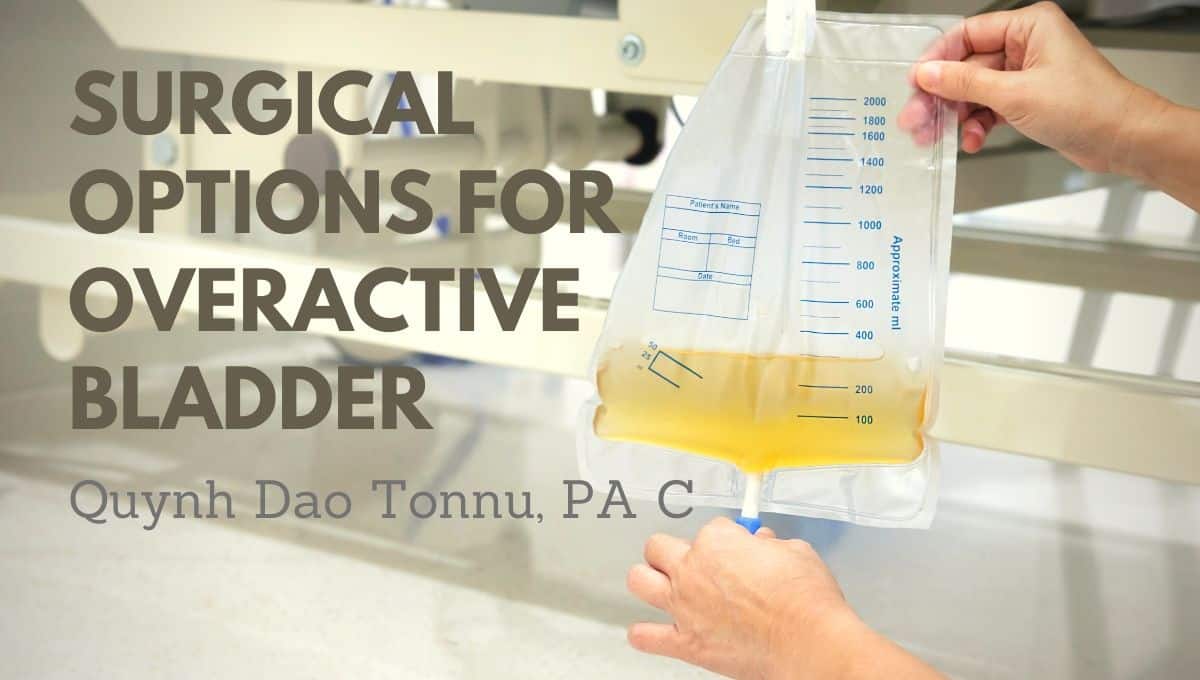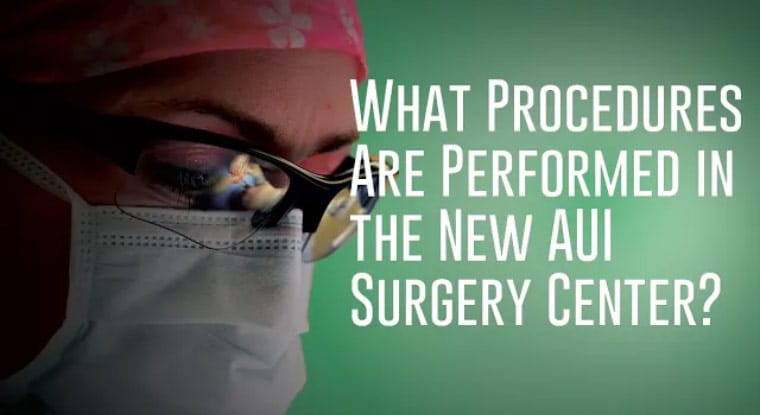Choosing between surgery and radiation for prostate cancer? Our urologists provide expert insights for informed decisions at Advanced Urology Institute.
Continue readingWhat Common Surgeries Does Dr. Brian Hale Perform?
Dr. Brian Hale of Tampa, FL discusses the common surgeries he performs including kidney stone removal, prostate surgery, and cancer treatment.
Continue readingSurgical Options for Overactive Bladder
If you feel frequent, sudden urges to urinate that you cannot control, you might be suffering from overactive bladder. This condition can lead to feelings of embarrassment or shame, but it’s a common problem and can be treated in a variety of ways. For many people, overactive bladder can be treated with lifestyle changes such as special diet, weight loss, regularly timed trips to the bathroom, and exercises to strengthen the pelvic floor. Dealing with symptoms by using absorbent pads is also an option.
 However, for some people, these methods are not enough to ensure they can live a healthy, fulfilling life. In these situations, surgical intervention is an option to correct overactive bladder problems.
However, for some people, these methods are not enough to ensure they can live a healthy, fulfilling life. In these situations, surgical intervention is an option to correct overactive bladder problems.
Augmentation Cytoplasty
One of the options for treating overactive bladder is called augmentation cytoplasty. This procedure increases the size of the bladder. The surgeon accomplishes this by removing a small part of the intestine and using it to replace parts of the bladder in order to increase its capacity. For some people, this procedure allows them to resume normal bladder function. For others, the use of a catheter may be necessary for the rest of their life.
Urinary Diversion Surgery
Another surgical treatment option for overactive bladder is urinary diversion surgery. This procedure involves diverting urine from the bladder. One option for bypassing the bladder involves linking the ureters, which normally connect the kidneys to the bladder, to an ostomy bag outside of the body. Another option involves the creation of a new bladder inside of the patient’s body, which means they will be able to continue normal urinary function.
Bladder Removal
Bladder removal surgery, or a cystectomy, is the last resort option for patients with overactive bladder for whom no other treatment has been successful. For men, bladder removal surgery also involves the removal of part of the prostate; for women, it involves removal of the uterus, ovaries and part of the vagina. Because this is a risky procedure that involves multiple organs, it is usually only used for more serious urological conditions such as bladder cancer or birth defects. Removal of the bladder necessitates the use of a urinary diversion such as an ostomy bag or a stoma.
An overactive bladder can be a debilitating condition, but there are many options for treatment. If you are dealing with this issue, the physicians at Advanced Urology Institute are here to help you reach a diagnosis and find a treatment to restore your quality of life.
What Procedures Are Performed in the New AUI Surgery Center?
Advanced Urology Institute offers a wide range of outpatient urology procedures in every new surgery facility. Whenever possible, there is a preference for treating patients in outpatient settings where primary, less complicated interventions are provided by board-certified urologists and other skilled medical professionals. Patients have the same quality of care they would get at a hospital setting at a lower cost. And with increased availability of advanced medical technology for outpatient care, new surgical centers have ensured redistribution of procedures and improved the efficiency of delivery of services.
Large number of procedures
At AUI, new surgery centers are used for a large number of procedures, including simple reconstructive operations, stone disease, scrotoplasty, meatoplasty, orchiopexy, pelvic prolapse, prostate and bladder procedures. For instance, urologists at new surgery centers treat incontinence, hematuria, kidney stones, urethritis, inguinal hernia, hydrocele, prostatitis, BPH, urinary tract trauma, urethral strictures, inflammatory urinary tract and bladder diseases, and urinary tract infections. And the fact that the centers are found in different locations encourages redistribution of care and access by more patients.
Common procedures performed in new AUI centers include:
- Prostate biopsy: Sampling of diagnostic tissue to be used to test for cancer cells.
- Bladder biopsy: Removing or sampling of tissue from the lining of the bladder.
- Ureteroscopy: Removing kidney stones using thin telescopic instruments
- Cystoscopy: Using a tiny camera to examine an affected area in the bladder through the urethra.
- Lithotripsy: Using shock waves to break down kidney stones.
- Penile prosthesis: Implanting a device in the penis to treat erectile dysfunction.
- Vasectomy for male sterilization.
- Circumcision: Removing some or all prepuce (foreskin) from the penis.
- Incontinence sling procedure: Implanting an internal support to the urethra to lift it to the normal position and treat incontinence.
- Laser vaporization or transurethral resection of prostate: Using a tiny instrument with a laser or electrical loop inserted into the penis to help remove obstructing tissue.
- Brachytherapy: Treating prostate cancer by inserting radioactive “seeds” directly into the tissues harboring the cancerous tumor.
- Hypospadias: Reconstructing a straight penis, making its urethral opening as close to the penis tip as possible.
- InterStim (sacral nerve stimulation): Implanting a tiny pacemaker near the tailbone.
- UroLift: Procedure to lift or hold the enlarged prostate tissue out of the way to prevent blockage of the urethra.
- Botox injection: Injecting Botox directly into bladder muscles.
For the more complex procedures that require special equipment, patients are usually admitted to the hospital. For example, robotic surgery procedure, pyeloplasty (reconstruction of renal pelvis), nephrectomy, ureteral reimplants and ureteral stent placement are conducted in hospital settings.
At Advanced Urology Institute, we are committed to delivering top-notch urological care to all our patients. Our surgeons are fully-qualified, board-certified, fellowship-trained urologists, who are renowned for their exceptional expertise in treating urological problems. We also have surgical centers that are supplied with the latest medical equipment and technologies to provide the best possible care.
For more information about our urological services, visit the Advanced Urology Institute website.





